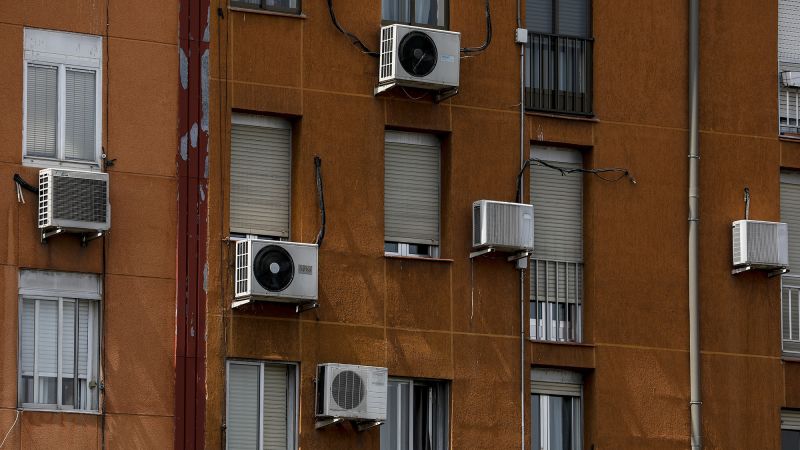Climate Change And Cooling: Why Is Air Conditioning Rare In Europe?

Welcome to your ultimate source for breaking news, trending updates, and in-depth stories from around the world. Whether it's politics, technology, entertainment, sports, or lifestyle, we bring you real-time updates that keep you informed and ahead of the curve.
Our team works tirelessly to ensure you never miss a moment. From the latest developments in global events to the most talked-about topics on social media, our news platform is designed to deliver accurate and timely information, all in one place.
Stay in the know and join thousands of readers who trust us for reliable, up-to-date content. Explore our expertly curated articles and dive deeper into the stories that matter to you. Visit Best Website now and be part of the conversation. Don't miss out on the headlines that shape our world!
Table of Contents
Climate Change and Cooling: Why is Air Conditioning Rare in Europe?
Europe is sweltering. Record-breaking heatwaves are becoming increasingly frequent, prompting questions about Europe's surprisingly low air conditioning adoption rate compared to other regions like North America or parts of Asia. While climate change is driving demand for cooling solutions, a complex interplay of factors explains why air conditioning remains relatively uncommon across much of the continent. This isn't just a matter of comfort; it raises significant concerns about public health and the future energy demands of a warming Europe.
Historical Architectural Design and Building Codes
Europe's architectural heritage plays a significant role. Many older buildings, particularly in Southern Europe, are designed to passively stay cool. Thick walls, small windows, and shaded courtyards offer natural insulation, mitigating the need for artificial cooling. These traditional building techniques, honed over centuries, provide a level of climate control that modern, energy-efficient designs are only now beginning to match. However, modern construction often sacrifices these passive cooling features in favor of more modern aesthetics, leading to increased energy consumption and reliance on air conditioning. New building codes are increasingly addressing this, incorporating sustainable design principles and emphasizing energy efficiency.
Cultural Attitudes and Preferences
Beyond architecture, cultural norms also contribute to the lower adoption rate. Many Europeans are accustomed to warmer temperatures and have developed coping mechanisms like siesta periods, lighter clothing, and increased reliance on fans. There's a perceived association of air conditioning with excessive consumerism and environmental impact, a perspective that influences individual choices. This cultural preference for natural cooling methods is slowly shifting, however, particularly amongst younger generations who are more acutely aware of climate change impacts.
Energy Efficiency Concerns and Costs
The high cost of purchasing and running air conditioning units is a significant barrier. Combined with concerns about the environmental impact of increased energy consumption, many Europeans opt for more energy-efficient alternatives like fans or improved insulation. Furthermore, the electricity grids in some European countries are not always equipped to handle a sudden surge in demand for air conditioning, potentially leading to power outages during heatwaves. This infrastructure limitation is a major factor influencing adoption rates, especially in older, less modernized systems.
Public Health Implications and the Future
The low adoption of air conditioning raises serious concerns about public health, particularly for vulnerable populations like the elderly and those with pre-existing health conditions. Heatwaves are already causing increased hospital admissions and mortality rates across Europe. As climate change intensifies, the absence of widespread air conditioning could lead to significant health crises. This highlights the need for both increased access to cooling solutions and proactive public health strategies to mitigate the risks associated with extreme heat.
Moving Forward: A Sustainable Approach
Europe faces a challenge: balancing the need for cooling solutions with the imperative to minimize environmental impact. The future likely involves a multi-pronged approach:
- Investing in energy-efficient cooling technologies: Research and development into more sustainable refrigerants and improved air conditioning units are crucial.
- Improving building design and insulation: New buildings must incorporate passive cooling strategies and energy-efficient designs to minimize the reliance on artificial cooling.
- Developing smart grids: Modernizing electricity grids to handle increased demand during heatwaves is essential for preventing power outages.
- Public awareness campaigns: Educating the public about the health risks of extreme heat and the benefits of energy-efficient cooling solutions is vital.
The rising temperatures in Europe are undeniable. Addressing the issue of cooling requires a holistic approach that considers cultural preferences, economic factors, public health, and environmental sustainability. The future of European cooling will likely involve a blend of traditional methods and innovative technologies aimed at achieving both comfort and climate responsibility. Ignoring the problem is not an option; a proactive and sustainable approach is paramount for the well-being of European citizens and the preservation of the continent's environment.

Thank you for visiting our website, your trusted source for the latest updates and in-depth coverage on Climate Change And Cooling: Why Is Air Conditioning Rare In Europe?. We're committed to keeping you informed with timely and accurate information to meet your curiosity and needs.
If you have any questions, suggestions, or feedback, we'd love to hear from you. Your insights are valuable to us and help us improve to serve you better. Feel free to reach out through our contact page.
Don't forget to bookmark our website and check back regularly for the latest headlines and trending topics. See you next time, and thank you for being part of our growing community!
Featured Posts
-
 Did Netflixs Most Popular Show Stick The Landing A Review Of The Series Conclusion
Jul 04, 2025
Did Netflixs Most Popular Show Stick The Landing A Review Of The Series Conclusion
Jul 04, 2025 -
 Pound Plummets Following Reeves Remarks Analysis Of The Economic Fallout
Jul 04, 2025
Pound Plummets Following Reeves Remarks Analysis Of The Economic Fallout
Jul 04, 2025 -
 Dakota Johnsons Healing Journey A Girls Trip With Kate Hudson
Jul 04, 2025
Dakota Johnsons Healing Journey A Girls Trip With Kate Hudson
Jul 04, 2025 -
 Kate Hudson And Dakota Johnson Enjoying A Much Needed Getaway
Jul 04, 2025
Kate Hudson And Dakota Johnson Enjoying A Much Needed Getaway
Jul 04, 2025 -
 Netflixs Top Show Ends Its Run Success Or Disappointment
Jul 04, 2025
Netflixs Top Show Ends Its Run Success Or Disappointment
Jul 04, 2025
Latest Posts
-
 Raf Brize Norton Break In Four Face Charges
Jul 04, 2025
Raf Brize Norton Break In Four Face Charges
Jul 04, 2025 -
 Scrutinizing The Nomination A Young Appointees Troubling Background And Potential Conflicts
Jul 04, 2025
Scrutinizing The Nomination A Young Appointees Troubling Background And Potential Conflicts
Jul 04, 2025 -
 China Tibet Conflict Bbc Coverage On Dalai Lamas 90th Birthday And Ongoing Resistance
Jul 04, 2025
China Tibet Conflict Bbc Coverage On Dalai Lamas 90th Birthday And Ongoing Resistance
Jul 04, 2025 -
 Idaho Murders Cnn Reports Bryan Kohbergers Admission
Jul 04, 2025
Idaho Murders Cnn Reports Bryan Kohbergers Admission
Jul 04, 2025 -
 Torture Claims In El Salvadors Mega Prison Kilmar Abrego Garcias Legal Team Speaks Out
Jul 04, 2025
Torture Claims In El Salvadors Mega Prison Kilmar Abrego Garcias Legal Team Speaks Out
Jul 04, 2025
